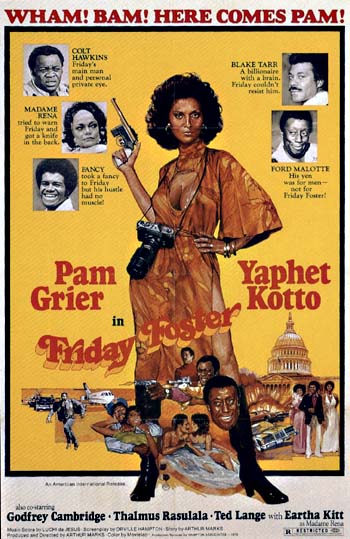★★★
“Giant Fireballs, Volume 2.”
 Prince Six (Tan) is plotting rebellion against the legitimate government, but Ming (Chu) has obtained a piece of compromising evidence from a dying Imperial guard. Before he can deliver it, the seal proving his identity is lifted by Tang Lyn-Yu (Ng), who runs a circus troupe, but has set her amorous eyes on Mind. He returns to the troupe, to try and locate the seal, but also there, undercover, is Fire Devil (Lin), who has been tasked by Six with locating and destroying the evidence of his treachery. However, after her involvement in a battle which leaves a young child orphaned, along with her beginning to fall for Ming, she begins to question whether she is on the right side of the fight. It doesn’t count as much of a spoiler to say that it ends with Fire Devil taking on Six, in a finale which involves so many things blowing up, you’d be forgiven for thinking the title of the film was as given at the top.
Prince Six (Tan) is plotting rebellion against the legitimate government, but Ming (Chu) has obtained a piece of compromising evidence from a dying Imperial guard. Before he can deliver it, the seal proving his identity is lifted by Tang Lyn-Yu (Ng), who runs a circus troupe, but has set her amorous eyes on Mind. He returns to the troupe, to try and locate the seal, but also there, undercover, is Fire Devil (Lin), who has been tasked by Six with locating and destroying the evidence of his treachery. However, after her involvement in a battle which leaves a young child orphaned, along with her beginning to fall for Ming, she begins to question whether she is on the right side of the fight. It doesn’t count as much of a spoiler to say that it ends with Fire Devil taking on Six, in a finale which involves so many things blowing up, you’d be forgiven for thinking the title of the film was as given at the top.
As usual, the fight scenes show why Yuen Woo-Ping is the greatest action director in modern cinema. Unfortunately, the bits between the fight scenes, also show why he is not the greatest director in modern cinema; it’s as if all the invention and imagination went into the wire-fu. Yuen appears content for the rest to be told with a series of bland characters (Chu is entirely forgettable, and shows the range of a wardrobe), desperately unfunny stabs at comedic mugging (courtesy of the Empress of Comedic Mugging, Ng, who has basically made her entire career out of that sort of thing), and broad cliché (Taotao the orphan, who could only be more obviously designed to be Adorable with a capital A, if he was carrying a box of sneezing baby pandas). The results are never less than unsubtle, and rarely pass as adequate.
It’s up to Lin to carry the emotional heart of the film, and she does well enough. At one point, Six tells her he doesn’t want her to be a dog, obeying him without question, he wants a hawk, soaring free. I guess he gets his wish: however, considering how that turns out (reminder: a large number of giant fireballs), it probably wasn’t the wisest of similes for him to choose. More exploration of their relationship, e.g. how did she come to work for him, would have been preferred over the less successful element that may well have you reaching for the fast-forward button.
Dir: Yuen Woo-ping
Star: Joe Chu, Brigitte Lin, Sandra Ng, Tan Lap-Man





 The low score for this is partly not entirely the film’s fault. Despite the title, it’s actually the third entry in a series of TV movies – following First Daughter and First Target. All focus on blonde Secret Service agent Alex McGregor, charged with protecting the President and his family. However, only this one is available on Netflix, which is where I picked it up: had I known in advance, I would likely have started at the beginning. Certainly, the abundance of references to events prior to the start of this movie becomes explicable – if no less irritating – and this might well make more sense if you’ve seen, in particular, First Daughter. The makers seem largely to ignore the second entry, First Target – perhaps because the role of McGregor there was played by Daryl Hannah, after Mariel Hemingway turned down the role she had played in #1. She returned here,
The low score for this is partly not entirely the film’s fault. Despite the title, it’s actually the third entry in a series of TV movies – following First Daughter and First Target. All focus on blonde Secret Service agent Alex McGregor, charged with protecting the President and his family. However, only this one is available on Netflix, which is where I picked it up: had I known in advance, I would likely have started at the beginning. Certainly, the abundance of references to events prior to the start of this movie becomes explicable – if no less irritating – and this might well make more sense if you’ve seen, in particular, First Daughter. The makers seem largely to ignore the second entry, First Target – perhaps because the role of McGregor there was played by Daryl Hannah, after Mariel Hemingway turned down the role she had played in #1. She returned here,  After a freeway chase ends in a fatal crash, a policewoman (Lizette) goes undercover to infiltrate the warring gangs of car thieves responsible. As “Baby” Martinez, she helps Eve (Lethridge) evade capture by an irate car-owner and, as a result, is recruited to join the all-female group of which Eve is a part, operating under the protection of Mama (Olivia Brown). However, Eve has a past to contend with, having defected from the gang led by Knight (Parker) – and worse still, taken his classic car with her. Unknown to her, the trunk holds a stash of drugs, whose loss leaves Knight feeling the heat from those in the criminal food chain above him. As a result, he’s prepared to go to any lengths to recover his property.
After a freeway chase ends in a fatal crash, a policewoman (Lizette) goes undercover to infiltrate the warring gangs of car thieves responsible. As “Baby” Martinez, she helps Eve (Lethridge) evade capture by an irate car-owner and, as a result, is recruited to join the all-female group of which Eve is a part, operating under the protection of Mama (Olivia Brown). However, Eve has a past to contend with, having defected from the gang led by Knight (Parker) – and worse still, taken his classic car with her. Unknown to her, the trunk holds a stash of drugs, whose loss leaves Knight feeling the heat from those in the criminal food chain above him. As a result, he’s prepared to go to any lengths to recover his property.



 Nami (Kaji) is about to get married, but her wedding day is rudely interrupted by the arrival of the cops, who arrest her. On the way to prison (and, unsurprisingly, death row, given the body count left behind in the previous three movies), she takes out the driver, causing a crash. The injured Scorpion staggers away, and is rescued by Kudo (Tamura), a former political radical who was brutalized by the police for his actions, and so has a massive load of resentment against them. After being informed of Kudo’s harbouring of Nami by a worked at the sex-club where he works, the cops take him in: and use both physical and psychological torture to try and make him give up her location. Eventually arrested, Nami is sentenced to death, but the cops intend to make sure the time leading up to her execution is as unpleasant and possible, and the detective in charge, Hirose (Tsukata), is intent on making even Nami’s death as lonely an experience as possible.
Nami (Kaji) is about to get married, but her wedding day is rudely interrupted by the arrival of the cops, who arrest her. On the way to prison (and, unsurprisingly, death row, given the body count left behind in the previous three movies), she takes out the driver, causing a crash. The injured Scorpion staggers away, and is rescued by Kudo (Tamura), a former political radical who was brutalized by the police for his actions, and so has a massive load of resentment against them. After being informed of Kudo’s harbouring of Nami by a worked at the sex-club where he works, the cops take him in: and use both physical and psychological torture to try and make him give up her location. Eventually arrested, Nami is sentenced to death, but the cops intend to make sure the time leading up to her execution is as unpleasant and possible, and the detective in charge, Hirose (Tsukata), is intent on making even Nami’s death as lonely an experience as possible. When this begins, Nami (Kaji) is on the run, and slices the arm off Detective Kondo (Narita) after he handcuffs himself to her. She befriends street hooker Yuki (Watanabe), who runs foul of the locak Yakuza gang by turning tricks on their turn, while trying to care for her brain-damaged brother, whom she also services sexually, to stop him from raping women(!). After Nami is involved in the death of a gang member who was blackmailing her, the gang’s madam Katsu (Lee), who knew the Scorpion from her own prison days, captures her, locking our heroine up in a literal big bird-cage. But after the true horror of the Yakuza’s treatment of their women is revealed (it starts with a golf-club going where no golf-club should ever go), Nami escapes and carves a bloody path of revenge on those responsible. When Katsu realizes what’s going on, she turns herself in to the police, figuring jail will be safe from Sasori’s wrath. Take a wild stab in the dark… Which, by coincidence is exactly what Katsu deserves.
When this begins, Nami (Kaji) is on the run, and slices the arm off Detective Kondo (Narita) after he handcuffs himself to her. She befriends street hooker Yuki (Watanabe), who runs foul of the locak Yakuza gang by turning tricks on their turn, while trying to care for her brain-damaged brother, whom she also services sexually, to stop him from raping women(!). After Nami is involved in the death of a gang member who was blackmailing her, the gang’s madam Katsu (Lee), who knew the Scorpion from her own prison days, captures her, locking our heroine up in a literal big bird-cage. But after the true horror of the Yakuza’s treatment of their women is revealed (it starts with a golf-club going where no golf-club should ever go), Nami escapes and carves a bloody path of revenge on those responsible. When Katsu realizes what’s going on, she turns herself in to the police, figuring jail will be safe from Sasori’s wrath. Take a wild stab in the dark… Which, by coincidence is exactly what Katsu deserves. Right from the start, Nami (Kaji) established her utterly hardcore credentials, as she’s trying to dig her way out of the dungeon where she has been for the past year. With a spoon. Held in her teeth. She’s let out for the day because a bigwig is visiting, but takes the opportunity to attack warden Goda (Watanabe), almost depriving him of the sight of his other eye. As punishment for the resulting riot, Goda sends four guards to gang-rape Nami, and all the inmates are sent to a hard-labour camp. On the way back, they beat Nami as punishment, leaving her near-dead but it turns out that was just her ruse to get the guards to open the back of the van and escape. She leads the women across a blasted landscape, revenge once more on her mind, with Goda’s men in hot pursuit.
Right from the start, Nami (Kaji) established her utterly hardcore credentials, as she’s trying to dig her way out of the dungeon where she has been for the past year. With a spoon. Held in her teeth. She’s let out for the day because a bigwig is visiting, but takes the opportunity to attack warden Goda (Watanabe), almost depriving him of the sight of his other eye. As punishment for the resulting riot, Goda sends four guards to gang-rape Nami, and all the inmates are sent to a hard-labour camp. On the way back, they beat Nami as punishment, leaving her near-dead but it turns out that was just her ruse to get the guards to open the back of the van and escape. She leads the women across a blasted landscape, revenge once more on her mind, with Goda’s men in hot pursuit.